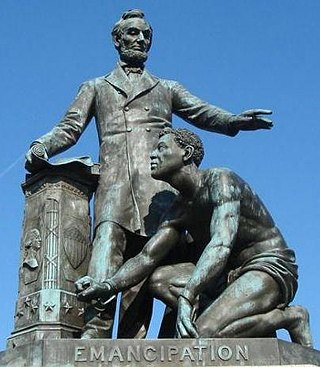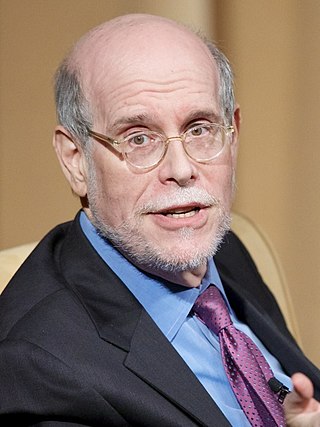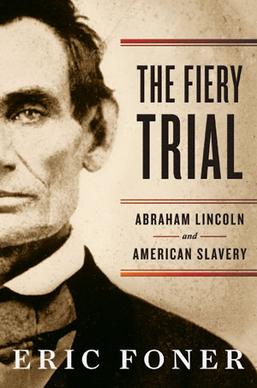
Abraham Lincoln was an American lawyer, politician, and statesman who served as the 16th president of the United States from 1861 until his assassination in 1865. Lincoln led the United States through the American Civil War, defending the nation as a constitutional union, defeating the insurgent Confederacy, abolishing slavery, expanding the power of the federal government, and modernizing the U.S. economy.

The Emancipation Proclamation, officially Proclamation 95, was a presidential proclamation and executive order issued by United States President Abraham Lincoln on January 1, 1863, during the American Civil War. The Proclamation had the effect of changing the legal status of more than 3.5 million enslaved African Americans in the secessionist Confederate states from enslaved to free. As soon as slaves escaped the control of their enslavers, either by fleeing to Union lines or through the advance of federal troops, they were permanently free. In addition, the Proclamation allowed for former slaves to "be received into the armed service of the United States". The Emancipation Proclamation played a significant part in the end of slavery in the United States.

Michael Richard Beschloss is an American historian specializing in the United States presidency. He is the author of nine books on the presidency.

Eric Foner is an American historian. He writes extensively on American political history, the history of freedom, the early history of the Republican Party, African American biography, the American Civil War, Reconstruction, and historiography, and has been a member of the faculty at the Columbia University Department of History since 1982. He is the author of several popular textbooks. According to the Open Syllabus Project, Foner is the most frequently cited author on college syllabi for history courses. According to historian Timothy Snyder, Foner is the first to associate the storming of the Capitol on January 6, 2021 with section three of the fourteenth amendment to the constitution.

Abraham Lincoln's position on slavery in the United States is one of the most discussed aspects of his life. Lincoln frequently expressed his moral opposition to slavery in public and private. "I am naturally anti-slavery. If slavery is not wrong, nothing is wrong," he stated. "I can not remember when I did not so think, and feel." However, the question of what to do about it and how to end it, given that it was so firmly embedded in the nation's constitutional framework and in the economy of much of the country, was complex and politically challenging. In addition, there was the unanswered question, which Lincoln had to deal with, of what would become of the four million slaves if liberated: how they would earn a living in a society that had almost always rejected them or looked down on their very presence.

Gabor S. Boritt is an American historian. He was the Robert Fluhrer Professor of Civil War Studies and Director of the Civil War Institute at Gettysburg College. Born and raised in Hungary, he participated as a teenager in the Hungarian Revolution of 1956 against the Soviet Union before escaping to America, where he received his higher education and became a scholar of Abraham Lincoln and the American Civil War. He is the author, co-author, or editor of 16 books about Lincoln or the War. Boritt received the National Humanities Medal in 2008 from President George W. Bush.

Allen Carl Guelzo is an American historian who serves as the Thomas W. Smith Distinguished Research Scholar and Director of the Initiative on Politics and Statesmanship in the James Madison Program at Princeton University. He formerly was a professor of History at Gettysburg College.
Douglas L. Wilson is the George A. Lawrence Distinguished Service Professor Emeritus of English at Knox College in Galesburg, Illinois, where he taught from 1961 to 1994. He then was the founding director of the Robert H. Smith International Center for Jefferson Studies at the Thomas Jefferson Foundation (Monticello) in Charlottesville, Virginia. In his retirement, he returned to Knox College to found and co-direct the Lincoln Studies Center with his colleague Rodney O. Davis.
James Oakes is an American historian, and is a Distinguished Professor of History and Graduate School Humanities Professor at the Graduate Center of the City University of New York where he teaches courses on the American Civil War and Reconstruction, Slavery, the Old South, Abolitionism, and U.S. and World History. He taught previously at Princeton University and Northwestern University.
Louise Taper is a historian and collector of Abraham Lincoln artifacts. She is the daughter-in-law of Mark Taper.
Julie Cellini is a free-lance journalist in Illinois with a writing career spanning over 50 years. She is a former newspaper reporter who has been active in historical and cultural preservation in Central Illinois for over 30 years. In the 1960s, while covering the political news beat, she met and later married Willam F. Cellini, a Springfield, Illinois city council member.

The Abraham Lincoln Bicentennial Commission (ALBC) was the congressionally created, 14-member federal commission focused on planning and commemorating the 200th birthday of the United States' 16th president on February 12, 2009. The commission served for ten years, from 2000 to 2010. Its official successor organization, announced in 2011 with an expanded board and broadened mission, is the Abraham Lincoln Bicentennial Foundation.

Frank J. Williams is a former Chief Justice of the Supreme Court of Rhode Island, a notable Abraham Lincoln scholar and author, and a justice of the Military Commission Review Panel.

Harold Holzer is a scholar of Abraham Lincoln and the political culture of the American Civil War Era. He serves as director of Hunter College's Roosevelt House Public Policy Institute. Holzer previously spent twenty-three years as senior vice president for public affairs at The Metropolitan Museum of Art in New York before retiring in 2015.
This bibliography of Abraham Lincoln is a comprehensive list of written and published works about or by Abraham Lincoln, the 16th president of the United States. In terms of primary sources containing Lincoln's letters and writings, scholars rely on The Collected Works of Abraham Lincoln, edited by Roy Basler, and others. It only includes writings by Lincoln, and omits incoming correspondence. In the six decades since Basler completed his work, some new documents written by Lincoln have been discovered. Previously, a project was underway at the Papers of Abraham Lincoln to provide "a freely accessible comprehensive electronic edition of documents written by and to Abraham Lincoln". The Papers of Abraham Lincoln completed Series I of their project The Law Practice of Abraham Lincoln in 2000. They electronically launched The Law Practice of Abraham Lincoln, Second Edition in 2009, and published a selective print edition of this series. Attempts are still being made to transcribe documents for Series II and Series III.
The Abraham Lincoln Bicentennial Foundation is the successor organization of the U.S. Abraham Lincoln Bicentennial Commission (ALBC), which was created by Congress and the President of the United States to plan the commemoration of Abraham Lincoln’s 200th birthday in 2009. The Abraham Lincoln Bicentennial Commission sunset on April 30, 2010
Michael A. Burlingame is an American historian noted for his works on Abraham Lincoln. He is the Naomi B. Lynn Distinguished Chair in Lincoln Studies at the University of Illinois Springfield. Burlingame has written or edited twenty books about Lincoln.

The Fiery Trial: Abraham Lincoln and American Slavery is a historical non-fiction book written by American historian Eric Foner. Published in 2010 by W. W. Norton & Company, the book serves as a biographical portrait of United States President Abraham Lincoln, discussing the evolution of his stance on slavery in the United States over the course of his life. The Fiery Trial, which derives its title from Lincoln's Annual Message to Congress of December 1, 1862, was the 22nd book written by Foner, the DeWitt Clinton Professor of History at Columbia University. It was praised by critics and won the 2011 Pulitzer Prize for History, the Bancroft Prize, and the Lincoln Prize.
The following outline is provided as an overview of and topical guide to Abraham Lincoln:











